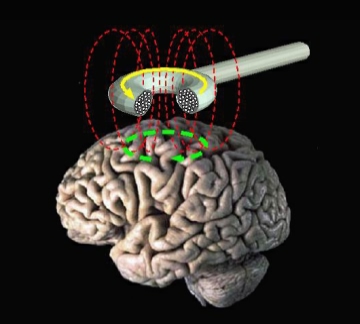 JP writes: "Do you know anything about using magnets for psychiatric problems? My friend has been going to a new age care center for this treatment. She is not getting any better. She is getting worse in fact. Thanks for any information."
JP writes: "Do you know anything about using magnets for psychiatric problems? My friend has been going to a new age care center for this treatment. She is not getting any better. She is getting worse in fact. Thanks for any information."Although I can't discern from your e-mail what kind of magnetic therapy your friend is using, I can say that there is a somewhat promising therapy known as transcranial magnetic stimulation (TMS) that is being used to treat depression. It consists of a device that beams magnetic pulses through the skull. The therapy stimulates nerve cells in certain areas of the brain linked to depression by delivering highly focused MRI-strength magnetic pulses. The pulses trigger small electric charges that spark brain cells into firing.
TMS is non-invasive (doesn't require surgery) and is non-systemic (doesn't circulate through the blood) and is gentle enough that patients don't require anesthesia or sedation. They can remain alert during the procedure, which usually takes about 40 minutes in a psychiatrist's office. The treatment is typically administered daily for four to six weeks.
As this article appearing on the Mayo Clinic website explains, "During an rTMS session for depression, an electromagnetic coil is placed against the scalp of your head. This coil delivers magnetic pulses that stimulate nerve cells in the region of your brain involved in mood control and depression. It's thought to activate regions of the brain that have decreased activity during depression."
There are different types of TMS such as rTMS and deep TMS. As the Clinic explains, "The difference between rTMS and deep TMS has to do with the type of coil used. The deep TMS coil stimulates deeper and wider areas of the brain, compared with rTMS. Deep TMS coils have been FDA-approved for OCD and to stop smoking."
The Food and Drug Administration (FDA) initially did not clear TMS devices for sale because they failed to demonstrate efficacy in a study of people with major depression who had not benefitted from prior treatment. In other words, scientific testing had not sufficiently answered the question as to whether or not a patient's improvement came from the TMS or from the drug they had been taking. In fact, the user manual for the NeuroStar TMS device, the only one that has FDA approval, clearly states that it has never been tested on patients who have not taken anti-depressants.
A year later, the FDA allowed the device to be marketed under specific conditions for the "treatment of Major Depressive Disorder in adult patients who have failed to achieve satisfactory improvement from one prior antidepressant medication . . . "
In July of 2011, they published a final rule allowing TMS devices to be used in adult patients who have failed to receive relief from at least one antidepressant and are not currently on any antidepressant therapy.
Research continues across several disciplines and, according to Harvard Health Publishing, the results are encouraging.
"Approximately 50% to 60% of people with depression who have tried and failed to receive benefit from medications experience a clinically meaningful response with TMS," this article states. "About one-third of these individuals experience a full remission, meaning that their symptoms go away completely."
The article goes on to warn that the results, although encouraging, are not permanent. "Like most other treatments for mood disorders, there is a high recurrence rate. However, most TMS patients feel better for many months after treatment stops, with the average length of response being a little more than a year."
While TMS appears to be on its way into the heralded halls of real science, there are a plethora of magnet hoaxes out there to be wary of. You can find hundreds of web sites advertising magnetic therapy products of all kinds, from bracelets and necklaces to belts, shoulder wraps and even mattress pads. None of their claims have any scientific backing.
Because of the prevalence of these hoaxes, it is highly recommended that the consumer do some homework before investing in any kind of magnet therapy.
© All Rights Reserved, Living His Life Abundantly®/Women of Grace® http://www.womenofgrace.com
